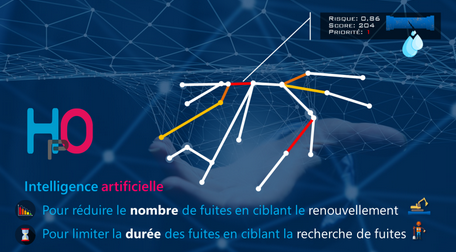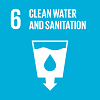PROJECT TITLE:
HpO® Artificial Intelligence System Deployment for High-Performance Kampala Drinking Water System
COUNTRY :
Uganda
AN INCUBATION PROJECT SUPPORTED BY:
VERBATIM OF THE PROJECT LEADER :
« Awakening environmental intelligence »
GEOGRAPHICAL LOCATION:
Municipality of Kampala, Uganda
SCALE OF INTERVENTION:
The area covered by the project is the territory served by Kampala Water through a 3000 km distribution network. The HpO® system will be applied to all networks for which the data will be prepared jointly and will achieve a level of accuracy sufficient for exploitation by artificial intelligence.
CONTEXT AND ISSUES OF THE TERRITORY:
The FASEP project "Deployment of the HpO® Artificial Intelligence System for the High-Performance Kampala Drinking Water Supply System" aims to provide the beneficiary Kampala Water with the HpO® artificial intelligence technology and the associated expertise and transfer of skills needed to initiate an optimised network renewal policy, to dramatically improve the performance of the water distribution system.
Kampala Water has a minimum of 36% Non-Revenue Water (mainly leaks in the distribution networks) in a context of climate change, resource stress, demographic growth and increasing water demand. In order to continue to serve the population, Kampala Water must inevitably control leakages and undertake the renewal of an asset worth several hundred million euros in a planned and targeted manner.
Kampala Water currently only responds to visible leaks (reported by users). Given the volume of losses, there is still a very high number of undetected leaks due to ageing pipes and connections. The connections alone are responsible for 50% of the volume of leaks according to studies carried out by Altereo over the last 30 years.
Only a complementary strategy of sustained renewal of the networks (pipes and connections) is capable of solving the problem of leaks sustainably and effectively.
It is clear that the main challenge for Kampala Water is to identify which pipes and connections to renew as a priority in order to obtain maximum efficiency from a technical (avoided leaks = resource conservation, energy savings, available volume, protection of sensitive users, continuity of service, quality of life) and financial (avoided leaks, avoided repairs, saved production costs) point of view.
The forward-looking dimension and the reliability brought to the renewal programmes by HpO® will not only contribute to meeting the challenges of leaks, the renewal of ageing infrastructures, and the preservation of resources, but also to optimising and encouraging public spending by public services on fundamentally unavoidable works. In addition, a total of €100 million in AFD loans will be devoted to network renewal. This FASEP project is timely and highly complementary.
GOAL(S) OF THE PROJECT :
- Reducing the duration of leaks (and therefore the volumes lost) has become accessible since the advent of GSM communications in Africa and the availability of autonomous and inexpensive sensors. Reducing the duration of leaks by targeting search and repair actions is now even more accessible thanks to the HpO® Artificial Intelligence system provided by Altereo.
- Reducing the number of leaks in the long term through the targeted renewal of the most degraded networks is now possible thanks to HpO®
Thanks to the precise targeting of the renewal of drinking water networks, it becomes possible to combine the financial efficiency of investments of several million euros per year for each water utility with the high performance of these water utilities by preventing up to 10 times more leaks in pipes and connections in the future.
The FASEP project "Deployment of the HpO® Artificial Intelligence System for the High Performance of the Kampala Water Supply Network" aims to provide Kampala Water with HpO® artificial intelligence technology and associated expertise to optimize leak detection and increase the efficiency of network renewal tenfold, with the aim of significantly improving the performance of the drinking water distribution system.
HpO® provides concrete benefits for the Responsible Renewal® of water networks
- Prediction of leakage and breakage risks
- Optimization of leakage search and detection
- Targeting of pipes and connections to be renewed in priority
- Drastically increase the efficiency of the renewal budget

SDG TARGETED BY THE PROJECT :






DG 6 : Ensure access to water and sanitation for all and sustainable management of water resources
6.1 : By 2030, ensure universal and equitable access to safe and affordable drinking water.
6.4 : By 2030, significantly increase the efficient use of water resources in all sectors and ensure the sustainability of withdrawals and freshwater supplies to address water scarcity and significantly reduce the number of people who suffer from water scarcity.
SDG 8 : Promote sustained, shared and sustainable economic growth, full and productive employment and decent work for all
8.4 : Progressively improve the efficiency of global resource use in both consumption and production through 2030, and ensure that economic growth no longer leads to environmental degradation, as envisaged in the 10-year framework of programmes on sustainable consumption and production, with developed countries taking the lead in this regard
SDG 9 : Build resilient infrastructure, promote sustainable industrialization that benefits all, and foster innovation
9.1 : Build quality, reliable, sustainable and resilient infrastructure, including regional and cross-border infrastructure, to support economic development and human well-being, with a focus on universal access, affordability and equity
9.a : Facilitate the development of sustainable and resilient infrastructure in developing countries by enhancing financial, technological and technical support to African countries, least developed countries, landlocked developing countries and small island developing states
9.4 : By 2030, modernize infrastructure and adapt industries to make them sustainable, through more efficient use of resources and increased use of clean and environmentally friendly technologies and industrial processes, with each country acting within its means
SDG 11 : Ensure that cities and human settlements are inclusive, safe, resilient and sustainable
11.b By 2020, significantly increase the number of cities and human settlements that adopt and implement integrated policies and action plans for inclusive living, resource efficiency, climate change adaptation and mitigation, and disaster resilience, and develop and implement, in line with the Sendai Framework for Disaster Risk Reduction (2015-2030), comprehensive disaster risk management at all levels.
SDG 12 : Establish sustainable consumption and production patterns
12.2 : By 2030, achieve sustainable management and efficient use of natural resources
12.6 : Encourage companies, especially large and transnational ones, to adopt sustainable practices and incorporate sustainability information in their reporting
SDG 13 : Take urgent action to address climate change and its impacts
13.1 : Build resilience and adaptive capacity in all countries to climate-related hazards and natural disasters..
PROJECT ISSUES:
Leaks - Data capitalization - GIS update - Intelligent renewal of the drinking water network - COVID
SECTORS CONCERNED:
Asset management - Renewal of drinking water networks - High performance of drinking water networks - Capacity Building
EXPECTED RESULTS:
- Operational assistance is given
- workflows and data capitalisation are continuously improved
- HpO® system with the use of artificial intelligence is installed for a state-of-the-art asset management strategy
- HpO® Collect, a mobile application for field staff is designed
- HpO® Citizen, a mobile application for citizens to report their visibility is designed.
STAKEHOLDERS OF THE PROJECT :
Actors involved:
National Water & Sewerage Corporation (NWSC) / Kampala Water
Project operator(s):
Altereo
Technical partner(s):
The FMDV / Watura
Financial partner(s):
FASEP
ESTIMATED COST OF THE PROJECT:
The total amount of the project is 764 396 €. The amount of the FASEP grant requested is €599,396. Altereo will finance 75% of the HpO® license, i.e. a contribution of 105 000 €.
The beneficiary will contribute €60,000 in kind, in the form of the provision of an office, means of transport to the sites and the valorisation of the personnel mobilised by the project.
SHORT-TERM ACTIONS (3 YEARS):
The HpO® system itself will be implemented during the second year in order to produce targeted leak detection and renewal programs. This second year will also be the year of the formalized transfer of skills and the perpetuation of the approach.
During these two years, the project and its results to date will be presented at high visibility events: the France-Africa Summit in Montpellier in July 2021, the African Water Association Congresses, the World Water Forum in Dakar in May 2022 and finally, a national or even regional restitution seminar at the end of the project.
LONG TERM ACTIONS (10 YEARS):
The forward-looking dimension and the reliability brought to the renewal programs by HpO® will not only contribute to meeting the challenges of leakage, renewal of aging infrastructure and resource conservation, but also to optimizing and encouraging public spending by utilities on fundamentally unavoidable works. In addition, a total of €100 million in AFD loans will be devoted to network renewal. This FASEP project is timely and highly complementary.




